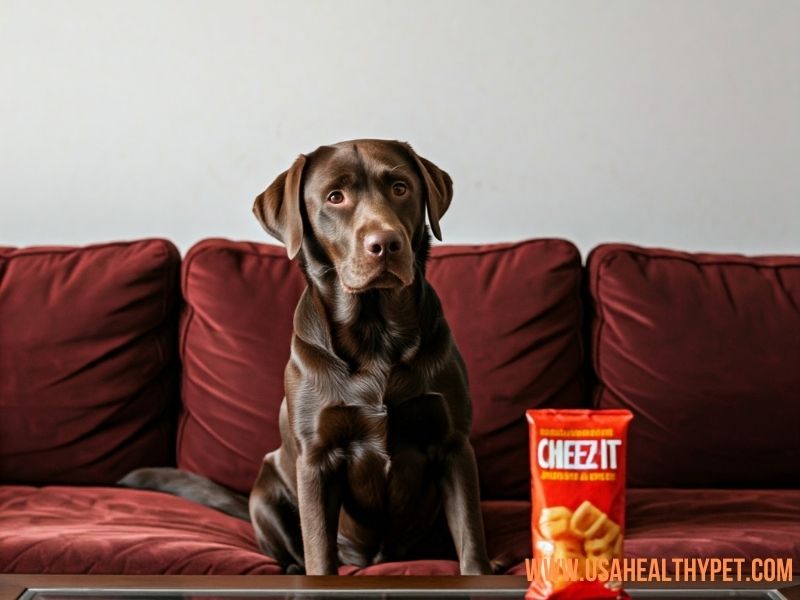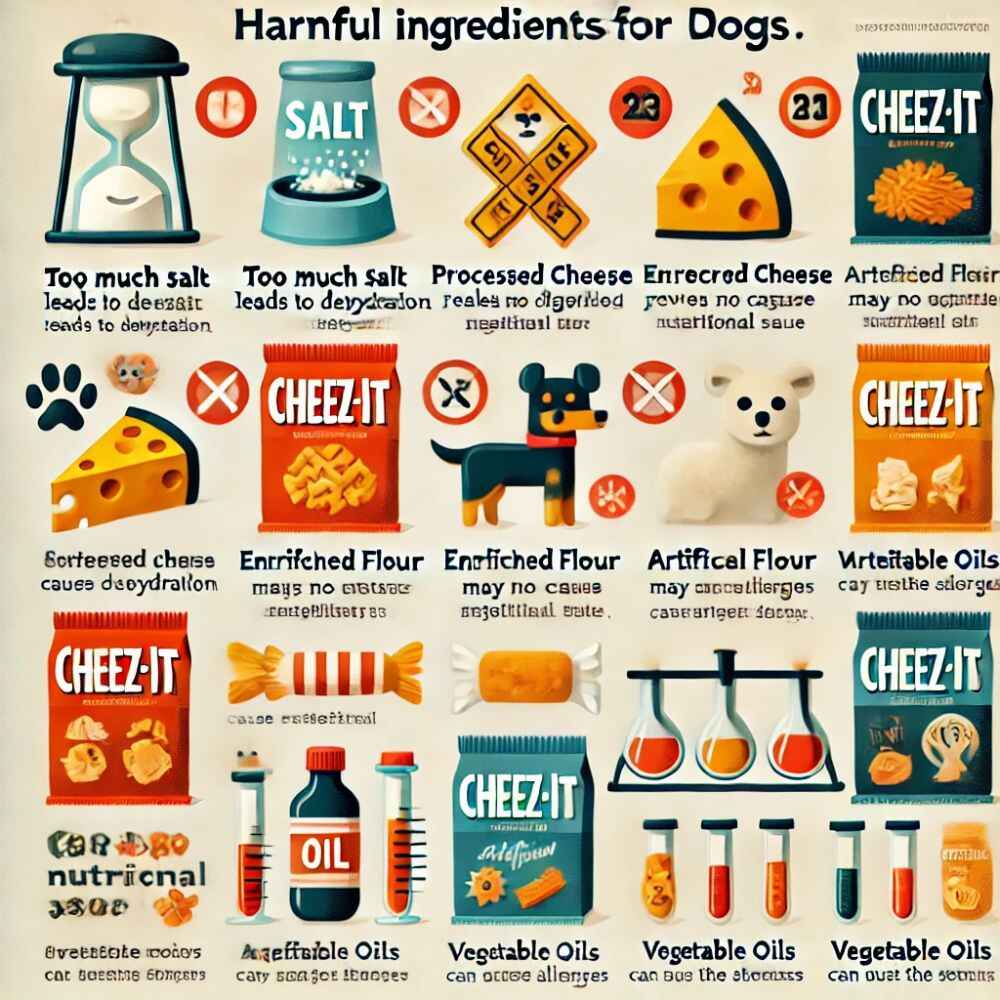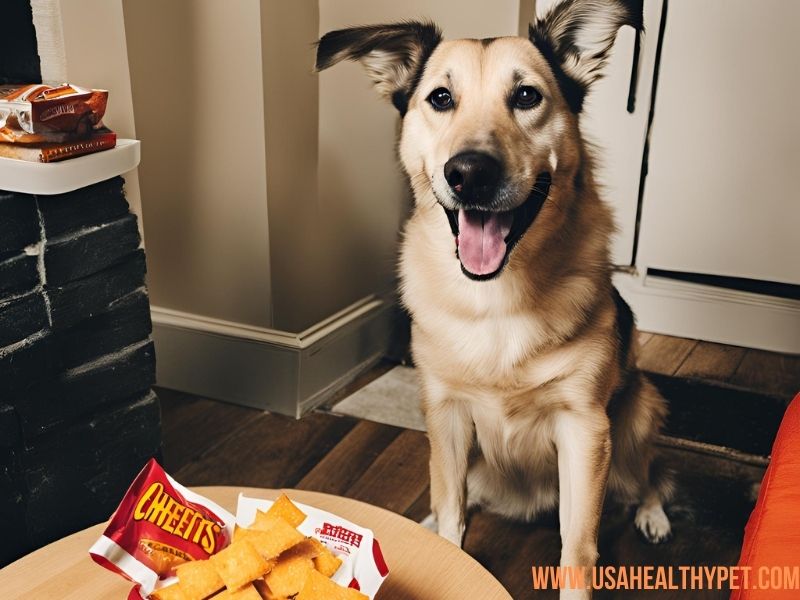Introduction: Can Dogs Eat Cheez-Its?
You’re enjoying a snack, maybe a handful of Cheez-Its, and your dog gives you those irresistible puppy eyes. It’s tempting to share, right?
But before you toss a square of cheesy goodness their way, you might wonder: Can dogs eat Cheez-Its? Is this snack harmless for them, or are you risking their health?
Let’s dive into what makes Cheez-Its a questionable snack for your furry friend.
What Are Cheez-Its?
First off, what are Cheez-Its? They’re those tiny, square-shaped crackers with a bold cheesy flavor that people love munching on. Made with cheese, enriched flour, salt, and vegetable oil, they’re crunchy, salty, and definitely made for humans—not dogs.
They’re a classic snack, but just because we enjoy them doesn’t mean they’re suitable for our pets.
According to Dr. Jennifer Coates, a veterinarian, while Cheez-Its aren’t toxic, their high salt, fat, and processed ingredients can harm dogs over time.
Do Cheez-Its Offer Any Nutritional Value for Dogs?
Cheez-Its contain some cheese, which has calcium and protein, but they also come packed with ingredients dogs don’t need.
The simple truth? Cheez-Its offer no real nutritional benefit to your dog. They’re filled with empty calories, meaning they don’t provide the vitamins and nutrients that dogs need to stay healthy.
Instead, they’re high in fat, salt, and carbs—stuff that can lead to health problems if fed in excess.

Ingredients: Are Cheez-Its Safe for Dogs?
Let’s break down the main ingredients in Cheez-Its and see how they stack up when it comes to dog safety:
Cheese
Cheese might sound like a safe bet for dogs, and many of them love it. However, processed cheese, like the kind found in Cheez-Its, is full of sodium and fat.
While a tiny bit might be fine, feeding processed cheese regularly could lead to digestive issues or even contribute to long-term problems like obesity.
Enriched Flour
Enriched flour is a type of processed wheat that’s stripped of nutrients and then “enriched” with vitamins and minerals.
While it’s not toxic, dogs don’t really need grains in their diet, especially refined ones. Dogs thrive on a diet of protein and healthy fats, not carbs, making this ingredient less than ideal.
Salt
Ah, salt—the ingredient that gives Cheez-Its their addictive flavor. But for dogs? Too much salt is a no-go.
Dogs don’t process salt the same way humans do, and consuming too much can lead to dehydration or even sodium ion poisoning in extreme cases.
Signs of salt poisoning include vomiting, diarrhea, tremors, and in severe cases, seizures.
A report by the National Research Council (NRC) states that the recommended daily sodium intake for an average-sized dog is much lower than what’s found in even a few Cheez-Its. Eating too many salty snacks can lead to dehydration or, in severe cases, salt poisoning. Symptoms of salt poisoning include vomiting, weakness, and in more serious cases, seizures.
Vegetable Oils
Vegetable oils are another ingredient that adds unnecessary fat to your dog’s diet. Consuming too much fat can lead to weight gain, and, over time, put stress on your dog’s heart and joints.
While a little bit of healthy fat is good for dogs, the kind in Cheez-Its is not the best kind.

Risks of Feeding Cheez-Its to Your Dog
So what’s the verdict? While an occasional Cheez-It might not cause an immediate issue, it’s not a good habit to start. Here are a few risks to keep in mind:
High Salt Content
Dogs only need a small amount of salt in their diet, and Cheez-Its are packed with it. Too much salt can lead to dehydration and other more serious issues. So, if you’ve been feeding your dog salty snacks, you may want to reconsider.
Processed Ingredients
Processed foods, in general, are not good for dogs. The artificial flavors, preservatives, and additives in Cheez-Its could upset your dog’s stomach or contribute to other health issues over time.
Potential Allergies
Some dogs have allergies to certain grains or dairy products. Cheez-Its contain both wheat and cheese, which could trigger an allergic reaction, leading to itchy skin, ear infections, or gastrointestinal upset.
What Happens If My Dog Eats Cheez-Its?
If your dog accidentally snags a couple of Cheez-Its from your plate, don’t panic. Eating a few crackers likely won’t cause harm, but watch for signs of an upset stomach like vomiting, diarrhea, or lethargy.
If your dog has consumed a large quantity, especially in a short period, you’ll want to contact your vet.
Excessive amounts of salt and fat can lead to more serious health problems like pancreatitis or salt poisoning, which need medical attention.
Healthier Snack Alternatives for Dogs
If you’re looking for snacks to share with your pup, there are plenty of healthier and more dog-friendly options than Cheez-Its. Let’s take a look:
Dog-Friendly Vegetables
- Carrots: Crunchy, low in calories, and great for dental health.
- Green beans: Full of fiber and vitamins, a perfect crunchy snack.
- Sweet potatoes: Rich in vitamins and easy to digest.
Fruits Dogs Can Enjoy
- Apples: Packed with fiber and vitamins (just be sure to remove the seeds).
- Blueberries: These little antioxidant powerhouses are great for dogs.
- Bananas: A sweet treat in moderation that provides potassium and vitamins.
Special Dog Treats
You can always buy specially formulated dog treats from your local pet store. These treats are made with dogs’ health in mind and can satisfy their cravings without the risks associated with human snacks.

How to Train Your Dog to Avoid Human Snacks
The best way to avoid sharing Cheez-Its with your dog is by training them not to beg for food in the first place. Here are some tips to help:
- Teach the “Leave It” Command: This simple command can save your dog from grabbing dangerous foods.
- Stick to a Feeding Routine: Feed your dog at the same time every day, so they’re less interested in your food.
- Provide Healthy Treats During Your Meals: Offer them a dog-friendly snack while you eat, so they don’t feel left out.
Conclusion: Should You Give Cheez-Its to Your Dog?
So, can dogs eat Cheez-Its? While they might not be toxic in small amounts, they’re certainly not a healthy snack option for your furry friend. The high salt, fat, and processed ingredients can lead to long-term health issues if given regularly.
Instead of sharing your Cheez-Its, opt for healthier treats like carrots, apples, or specially formulated dog treats. Your dog will thank you for it with a happy, wagging tail!
FAQs
1. Can a small amount of Cheez-Its harm my dog?
A few Cheez-Its here and there likely won’t hurt your dog, but it’s not something you want to make a habit. Stick to dog-friendly snacks for the best results.
2. What should I do if my dog eats a lot of Cheez-Its?
If your dog has consumed a large quantity of Cheez-Its, monitor them closely for signs of illness like vomiting or lethargy, and contact your vet if you’re concerned.
3. Are there any safe cheese alternatives for dogs?
Yes, small amounts of plain, low-fat cheese like mozzarella or cottage cheese can be given to dogs occasionally as a treat.
4. Why is salt bad for dogs?
Dogs don’t process salt the same way humans do. Too much salt can lead to dehydration, high blood pressure, or more serious conditions like sodium poisoning.
5. What are the best dog treats?
The best dog treats are those specifically formulated for dogs. Look for treats that are low in fat and free from artificial additives. Vegetables and fruits like carrots and apples are also great options.

Pingback: Freezing Dog Food for Enrichment: Tips for Making Food Fun